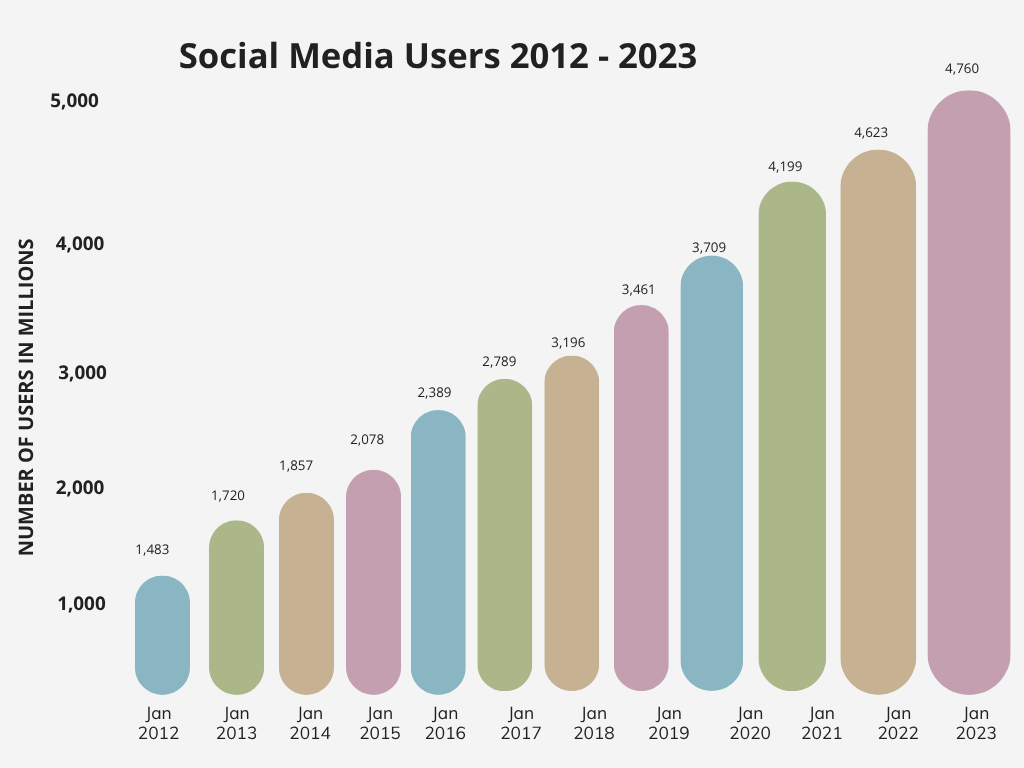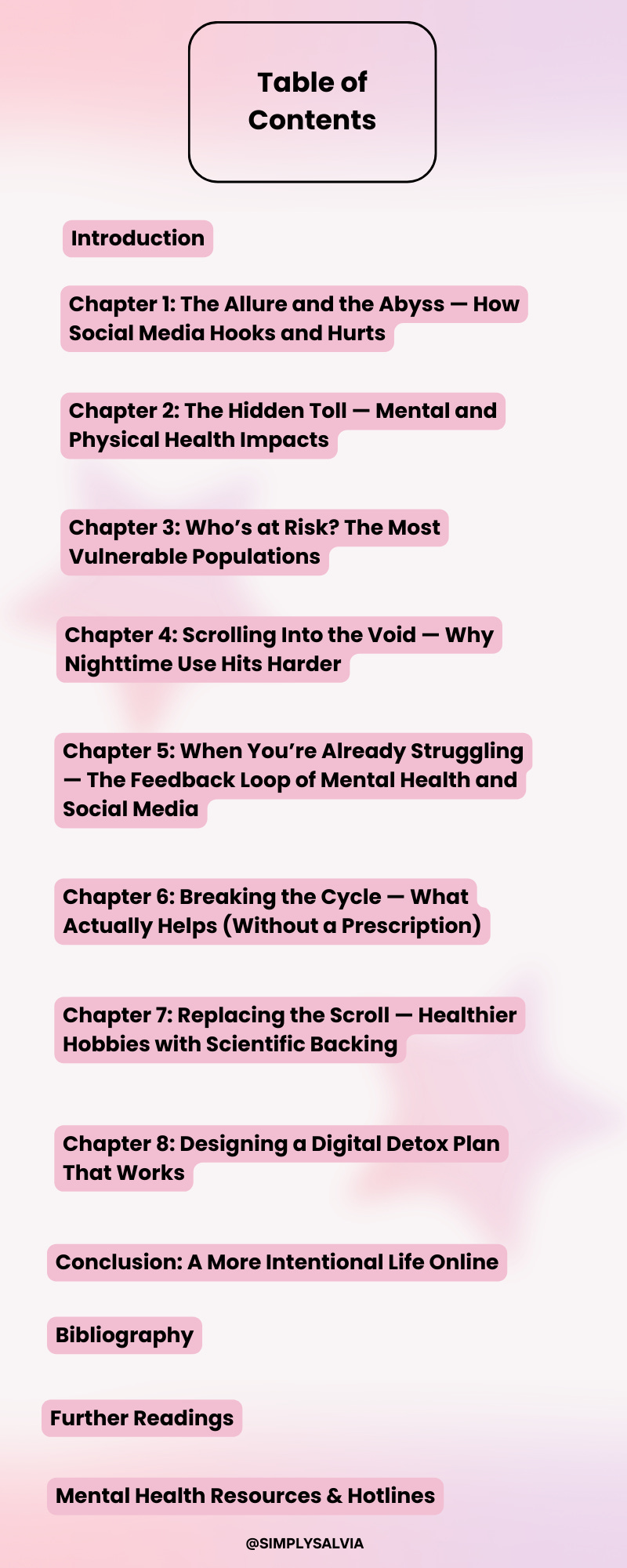Deep Dive: Doomscrolling, Dopamine & Digital Burnout
The science behind social media’s impact on stress, attention, and emotional well-being.
Introduction: The Double-Edged Screen
Social media has transformed how we communicate, entertain ourselves, and even perceive reality – all in barely a decade and a half. What began as niche websites in the early 2000s has, by the 2020s, become an almost ubiquitous fixture of modern life. In the United States alone, 69% of adults and 81% of teenagers use social media on a regular basis. Globally, billions of people now check Facebook, Instagram, TikTok, or other platforms daily – often multiple times per day. Among U.S. teens aged 13–17, an astonishing 95% report using a social media platform, and over one-third say they scroll “almost constantly.” In short, the majority of us are now virtually “plugged in” to social networks as part of our everyday routines.
Yet for all its benefits, this constant connectivity comes at a cost. Why this topic matters now more than ever is starkly evident in rising mental health concerns that have paralleled the rise of social media. We are in what many call a youth mental health crisis, and experts are increasingly scrutinizing social media’s role in it. The U.S. Surgeon General issued an advisory in 2023 warning that we “cannot conclude that social media is sufficiently safe for children and adolescents” given the alarming correlations with depression, anxiety, and other harms. Even among adults, awareness is growing that the endless scroll might be eroding our well-being – one recent poll found that one in three Americans is worried about social media’s impact on their mental health. In our always-on digital era, the need to understand social media’s double-edged nature – its perks and its pitfalls – has never been more pressing.
Who is this deepdive for? In short: for everyone touched by the tug-of-war between our screens and our sanity. It’s for teens and young adults glued to their phones yet feeling lonelier than ever. It’s for parents uneasy about their children’s online world and its influence on their self-esteem. It’s for women navigating Instagram during vulnerable life stages like pregnancy and noticing the strain of comparison. It’s for healthcare workers and students burned out from both real-world stresses and the additional layer of social media pressure. It’s for those already struggling with mental health issues – anxiety, depression, ADHD, eating disorders – who sense that the online ecosystem sometimes amplifies their pain. And it’s for anyone who has ended a doomscrolling session at 1 AM, eyes burning and heart heavy, wondering “Why do I feel so terrible?!” If you’ve ever suspected that the apps designed to connect and entertain us might also be draining or distorting us, you are not alone. This deepdive is written for you.
In the chapters ahead, I take an evidence-based journey through social media’s psychological allure and its hidden costs. We’ll see how and why these platforms hook us, leveraging primal reward circuits to keep us coming back for more – and how that relentless engagement can tip from habit to addiction. I’ll shine a light on the toll this takes on mental and physical health, from creeping feelings of depression or FOMO to stress-related aches and sleep deprivation. I’ll identify who is most at risk, from adolescents whose developing brains make them especially vulnerable, to new mothers, frontline workers, and others facing unique pressures. Late nights and doomscrolling get a chapter of their own, as I explore why using social media at 2 AM tends to hit different (and not in a good way). I’ll also examine the vicious cycle that occurs when you’re already struggling with mental health – how social media can act like gasoline on the fire of pre-existing depression, anxiety, or body image issues, locking users into a feedback loop of negative content and worsening mood.
Crucially, this deepdive is not just about what’s going wrong – it’s about how to make it right. The latter chapters focus on solutions and hope. I discuss practical strategies to break the cycle without needing a prescription: from setting healthier digital boundaries and “tech hygiene” habits, to leveraging lifestyle boosts like exercise, sleep, and time in nature. I’ll explore hobbies and habits that can replace mindless scrolling, with scientific backing for how activities like reading, crafting, volunteering or music can uplift your mind (and we’ll meet people who reclaimed their happiness by doing exactly that). Finally, we’ll walk through designing a personalized digital detox plan – a sustainable one that actually works for your life, not a cold-turkey crash that backfires. Whether you’re a student, a parent, or a professional, you’ll find tips to tailor these changes to your needs and to deal with relapses or resistance along the way.
Social media is often described as a double-edged sword, and indeed it is. On one edge, it offers unprecedented connectivity, community, and creativity – truly wonderful things. But on the other edge, it can cut deeply: undermining our self-esteem, our sleep, our attention spans, and our mental health. The goal of this deepdive is to help you understand both edges of the blade and learn to wield it more intentionally, so that you – not the algorithms or the endless feed – are in control.
With compassionate, science-backed insights, I invite you to examine your own relationship with social media. By the end, you’ll be armed with knowledge, strategies for change, and resources for support. It’s time to step back and ask: Are we using social media in a way that truly serves us, or are we caught in something that’s quietly harming us? If it’s the latter, what can we do – starting today – to reclaim our minds and lives?
Let’s dive in and find out. The journey to a healthier relationship with the online world begins now.





